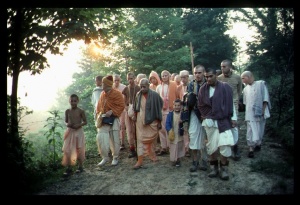CC Adi 16.3 (1975): Difference between revisions
(Vanibot #0027: CCMirror - Mirror CC's 1996 edition to form a basis for 1975) |
(Vanibot #0020: VersionCompareLinker - added a link to the Version Compare feature) |
||
| Line 2: | Line 2: | ||
<div style="float:left">'''[[Sri Caitanya-caritamrta (1975)|Śrī Caitanya-caritāmṛta (1975)]] - [[CC Adi (1975)|Ādi-līlā]] - [[CC Adi 16 (1975)|Chapter 16: The Pastimes of the Lord in His Childhood and Youth]]'''</div> | <div style="float:left">'''[[Sri Caitanya-caritamrta (1975)|Śrī Caitanya-caritāmṛta (1975)]] - [[CC Adi (1975)|Ādi-līlā]] - [[CC Adi 16 (1975)|Chapter 16: The Pastimes of the Lord in His Childhood and Youth]]'''</div> | ||
<div style="float:right">[[File:Go-previous.png|link=CC Adi 16.2 (1975)|Ādi-līlā 16.2]] '''[[CC Adi 16.2 (1975)|Ādi-līlā 16.2]] - [[CC Adi 16.4 (1975)|Ādi-līlā 16.4]]''' [[File:Go-next.png|link=CC Adi 16.4 (1975)|Ādi-līlā 16.4]]</div> | <div style="float:right">[[File:Go-previous.png|link=CC Adi 16.2 (1975)|Ādi-līlā 16.2]] '''[[CC Adi 16.2 (1975)|Ādi-līlā 16.2]] - [[CC Adi 16.4 (1975)|Ādi-līlā 16.4]]''' [[File:Go-next.png|link=CC Adi 16.4 (1975)|Ādi-līlā 16.4]]</div> | ||
{{CompareVersions|CC|Adi 16.3|CC 1975|CC 1996}} | |||
{{RandomImage}} | {{RandomImage}} | ||
==== TEXT 3 ==== | ==== TEXT 3 ==== | ||
| Line 12: | Line 11: | ||
:jīyāt kaiśora-caitanyo | :jīyāt kaiśora-caitanyo | ||
:mūrti-matyā gṛhāśramāt | :mūrti-matyā gṛhāśramāt | ||
:lakṣmyārcito | :lakṣmyārcito 'tha vāg-devyā | ||
:diśāṁ jayi-jaya-cchalāt | :diśāṁ jayi-jaya-cchalāt | ||
</div> | </div> | ||
| Line 20: | Line 19: | ||
<div class="synonyms"> | <div class="synonyms"> | ||
jīyāt—long live; kaiśora—situated in the kaiśora age; caitanyaḥ—Lord Caitanya Mahāprabhu; mūrti-matyā—having accepted such a body; gṛha-āśramāt—from a | jīyāt—long live; kaiśora—situated in the kaiśora age; caitanyaḥ—Lord Caitanya Mahāprabhu; mūrti-matyā—having accepted such a body; gṛha-āśramāt—from a householder's life; lakṣmyā—by Lakṣmī; arcitaḥ—being worshiped; atha—then; vāk-devyā—by the goddess of learning; diśām—of all directions; jayi—the conqueror; jaya-chalāt—on the plea of conquering. | ||
</div> | </div> | ||
| Line 27: | Line 26: | ||
<div class="translation"> | <div class="translation"> | ||
Long live Lord Caitanya Mahāprabhu in His kaiśora age! Both the goddess of fortune and the goddess of learning | Long live Lord Caitanya Mahāprabhu in His kaiśora age! Both the goddess of fortune and the goddess of learning worship Him. The goddess of learning, Sarasvatī, worshiped Him in His victory over the scholar who had conquered all the world, and the goddess of fortune, Lakṣmīdevī, worshiped Him at home. Since He is therefore the husband or Lord of both goddesses, I offer my obeisances unto Him. | ||
</div> | </div> | ||
Latest revision as of 15:44, 26 January 2020

A.C. Bhaktivedanta Swami Prabhupada
TEXT 3
- jīyāt kaiśora-caitanyo
- mūrti-matyā gṛhāśramāt
- lakṣmyārcito 'tha vāg-devyā
- diśāṁ jayi-jaya-cchalāt
SYNONYMS
jīyāt—long live; kaiśora—situated in the kaiśora age; caitanyaḥ—Lord Caitanya Mahāprabhu; mūrti-matyā—having accepted such a body; gṛha-āśramāt—from a householder's life; lakṣmyā—by Lakṣmī; arcitaḥ—being worshiped; atha—then; vāk-devyā—by the goddess of learning; diśām—of all directions; jayi—the conqueror; jaya-chalāt—on the plea of conquering.
TRANSLATION
Long live Lord Caitanya Mahāprabhu in His kaiśora age! Both the goddess of fortune and the goddess of learning worship Him. The goddess of learning, Sarasvatī, worshiped Him in His victory over the scholar who had conquered all the world, and the goddess of fortune, Lakṣmīdevī, worshiped Him at home. Since He is therefore the husband or Lord of both goddesses, I offer my obeisances unto Him.